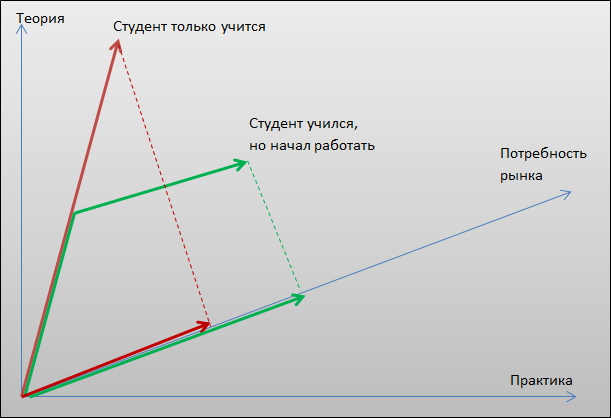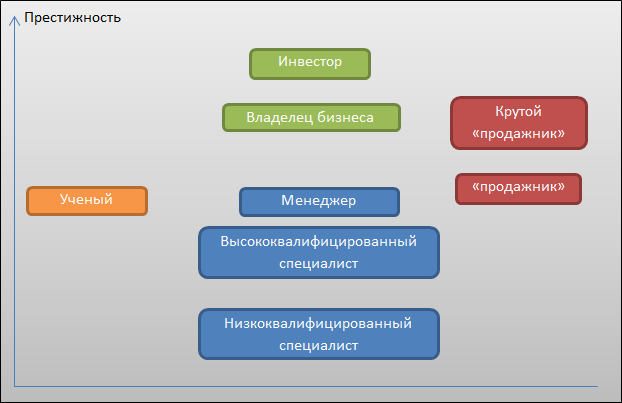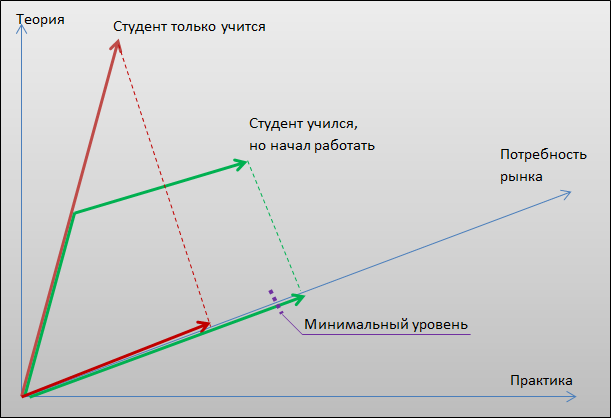Frames decide everything

To study or not to study? - that is the question.
Oddly enough, the answer to it depends on your personal outlook on the economy. I do not pretend to the truth in the last resort, I just wanted to understand and bring some clarity.
1 Basics of Economics
Market economy
The market economy is represented by thousands of companies that compete with each other. Companies are born, live a short life and die. In the first year, ¾ of all companies go bankrupt. For the first 5 years - 90-95%. The largest companies (from the Dow Jones list) live for 40-50 years.
The market situation is constantly changing. Therefore, in a market economy, companies need to respond very quickly to any changes in order to survive. It is possible to reduce costs - reduce costs, otherwise a competitor will do it, and you will leave the business (the company will go bankrupt).
')
If a company has fewer employees than it needs to serve the needs of its customers, it will receive less profit. If more - carries extra costs. Any company should strive to ensure that its functions are performed by the minimum number of employees. With maximum efficiency.
Therefore, companies prefer to hire highly specialized employees. So more effective. In other words, in a market economy, the need for high-class highly specialized employees is very high .
Moreover, medium-sized companies usually cannot afford to train employees. First of all, an employee cannot be attached to a company: the company will train him, and he will leave to work with competitors. Secondly, if the average lifetime of a company is 5-10 years, then long-term investment (which is training) does not benefit it. Although the larger the company, the more profitable it is to do it.
Soviet planned economy
From the point of view of a market economy, the “Soviet planned economy” most of all resembles one giant corporation. One mega-corporation owns all the enterprises on the market, all employees work for it.
But, the bigger the company, the more bureaucracy. And the “biggest company” should have the largest bureaucracy. Um Perhaps it was so.
Narrow specialists are no longer a necessity - the company is not fighting for its survival. Moreover, broad-based specialists are more profitable in the long run, but preparing them is long and expensive.
But, such a mega-company can afford to make long-term investments: to train wide-profile employees for their needs. This is a big plus. Other economy, other requirements.
2 Table of Ranks
If you ask who it is better to work with: the janitor or director, most likely you will answer - the director. It seems the answer is obvious, yes? Salary, working conditions, prestige.
But if you ask who it is better to work with - a clerk at a bank or a clerk at a post office, then almost everyone will answer - at a bank. Salary and working conditions seem to be the same. The bank may even be worse. So why? Kudos! A clerk in a bank - that sounds almost like a banker!
Planned Economy
In the union, the idea of the prestige of the professions was something like

Market economy
In a market economy, the situation is slightly different. Since the whole economy will stand out from competing companies, then on the top step is the person who owns his company. There are truth investors - people who, directly or through investment funds, own shares in dozens of companies. The balance of the preferences of the professions here is something like

It immediately catches the eye that the scientist is no longer considered such a prestigious specialty. This is achieved through two things:
1 There is no “crown” that scientists are used to wearing with us. There are no more divisions for a candidate, doctor and academician. Just PhD and all.
2 The role of businessmen and salespeople is increasing. The market economy means not just the presence of competition, but very strong competition. The business owner determines his strategy in the market, and salespeople are the "troops" of the business. All other employees - is the support of the troops.
Most successful students in the United States dream of opening their own company (to become businessmen), and not “go to science”. Why? A business owner is like an army general. And, as you know, a soldier must dream of becoming a general, and not work in the engineering troops.
3 Education
Planned Economy
If the question “how many years a higher education in the union lasted”, you answer “5 years”, then this answer is not entirely correct. Education lasted, in fact, 8 years. Of which 5 years is theoretical training, and another 3 years - practice - work on distribution. A person who has been taught for 5 years really could (and can) have very little. By the way, this is clearly seen in the example of doctors who must undergo a multi-year internship - they are gaining real experience.
Moreover, 5 years of study were not equivalent either. Usually, in the first three years, the basic sciences are read, and the remaining two go to specialization — more practical subjects are already being read.
Market economy
With the transition to a market economy, two blows were dealt to our education. Even three.
Blow 1 - canceled 3 years of work on the distribution.
It seems to be a good thing, but now graduates can not get experience in the state. companies, and private enterprises (which work in a market economy) employees who do not know how are not needed. From them one loss.
It is from here that the legs of the situation grow. they don't take a job. ”
Why don't private companies take such graduates to themselves? Imagine that a medical university student did not complete an internship. Anyone want to be treated? Not? Then which hospital wants to hire him?
We wanted the best, but it turned out - as always.
Strike 2 - transition to the Bologna system.
Again, the transition to international standards is a good thing. But how was it made? It was training for 5 years, rejected the last year and received a bachelor's degree. But the last two years - this is just a specialization! Those. Previously, there were 3 years of basic sciences and 2 years of specialization. Now there are 3 years of basic science and 1 year of specialization.
Now graduates not only have no practice, but also a theory. Alone fundamental knowledge. And how to apply them in real life, no student knows. And do not even guess.
It took a year, but added the same two! Yes, but this is a magistracy. They go there to study science. Those. practice and / or specialization there, of course, no. And not foreseen.
Strike 3 - focus on the labor market.
Universities are the only organizations that we are engaged in the preparation of highly qualified personnel for the economy at the expense of the state. Those. our taxes with you.
But for some reason, instead they are preparing scientists. The department produces employees of the department.
Not a single university will say that its task is to produce highly qualified specialists demanded on the labor market. Most often, in response, you will hear "teach," "comprehensively educate," "teach to think."
4 Science
Market economy
In a market economy, science is funded by ... companies! All large companies have research centers (R & D), which are engaged in the development of technologies / products that will give this company advantages in the global market.
Again. The company finances applied research, which should give it an advantage in the market, which will bring profit and cover research costs.
Sometimes institutions are hired for this, scientists are attracted, grants are allocated. But always with the aim to discourage this money. A company that spends more than it earns - goes bankrupt - is the law of the economy.
The state, in turn, funds basic research to expand the boundaries of applied research.
Even military developments are commercially used to recoup the costs.
In a market economy, scientists make sure that their discovery has received practical application. It is easiest to do this when doing research to order - i.e. according to the principle “demand creates supply”.
From the point of view of a market economy, a scientist who made a discovery and printed an article is like a startup who came up with a brilliant idea. Both still have to create a prototype, test it, receive investment, deepen research and development, establish a company, and enter the world market.
Planned Economy
From this point of view, our science has not changed much, and now it is very much like the science of the times of a planned economy.
Scientists do not do research that business needs, but do what they are interested in. Just like in the joke about a man who at night is looking for a purse not where he lost (and where you can probably find it), but there - where it is light.
Why do scientists in the West do applied research for business needs? Because the only alternative to this is running after a business so that it implements your designs. To do this, the scientist must first be an entrepreneur, understand the needs of the business, and then conduct research. It's complicated.
Our scientists do not even try to solve the problem - they simply ignore it. The state must finance science. And scientists have to publish articles. On the basis of the most worthy of them, foreign scientists will improve their applied development, and foreign companies will receive additional specific advantages over ours.
In a planned economy, no one demanded to implement scientific research. And in a market economy, such scientists are likened to startups who come up with an idea, publish its business plan and that's it. Sit and wait for income. Or more financing.
If the founders of Google had finished all the work by publishing the article “Page Rank - The Future of Search,” Google would never have existed. And its founders would never be billionaires.
So, our favorite scientists, maybe where you finish your work, the real work of the Scientist is just beginning?
5 Statistics
Some facts and statistics:
1 Russia ranks first in the world in the number of people with higher education ( proof ).
2 60% of people do not work in the specialty ( proof )
3 Scientists - many ( proof ).
4 Salary scientist average $ 640 ( proof )
5 There is a lack of highly qualified personnel ( proof ).
6 The most acute problem of Russian business is the lack of qualified personnel ( proof ).
7. There are many universities, but there are not enough qualified personnel ( proof )
Makes you wonder, isn't it?
6 Two Higher Education Paradigms
There are two higher education paradigms. One, older - that it teaches life in general, provides tools for understanding the world. The other, more practical and more modern: it's just a preparation for a particular profession. And which one do you practice?
Classic higher education.
Earlier, when most people were illiterate and worked with their hands, classical higher education gave a lot of advantages. The man was actually a cut above the rest. I saw a complete picture of the world, understood better what was going on, could connect facts and draw conclusions.
The study of the works of ancient philosophers, writing essays, debates, ... This education primarily taught a person to think, analyze, draw conclusions. In high school, people got access to knowledge - the world's heritage, the best books and treatises.
Higher professional education
The world has changed. Manual labor is increasingly automated and the need for intellectual labor specialists is growing: translators, aircraft designers, marketers, business administrators, ...
The Internet gives access not only to all knowledge of the world (!), But also allows you to find among them the most current and / or interesting for you. Moreover, Wikipedia provides knowledge in a structured and almost everything in the world.
Thanks to Indian films, the average person learned more about living in India than during all the time spent at school. Nobody was in North Korea, it was bad there, few were in America, but it’s good there - the picture of the world is not the most ideal, but it is probably better than its absence.
Classical education no longer gives indisputable advantages, and, like theology in the Middle Ages, is increasingly moving away from real life.
The ability to think is no longer a killer feature, but the same need as the ability to create a resume, find a job, ask for promotions, make and develop useful contacts, drive your own car and finances.
A graduate of a modern classical university is like a real cavalryman in the days of tank wedges and tactical nuclear weapons. And cool and helpless at the same time.
Frames decide everything
Both employers and students perceive universities as a forge of personnel, which they formally are not, have not been and do not want to be. On the other hand, where else can you train highly qualified personnel?
To become a cool designer, architect or programmer you need to study for years.
In the description of IT vacancies in the USA, they still write Master / PhD, when really cool programmers are needed. The need for universities that would train tough specialists is growing even faster than the shortage of these specialists.
7 Goldrat's Theory of Constraints
There is such a clever man - Goldrath. He developed a "theory of constraints", which actually allows you to find a bottleneck in any system. And also gives recommendations for its elimination or reasonable control.
So, when this theory was applied to industrial enterprises, it turned out that the most stupid thing that an enterprise can do is to do its job well. When an enterprise / factory cares only for its output, it brings a company that owns only losses to it, and contributes to its ruin.
The more products the plant produces, the faster the company goes bankrupt. After all, the products must not only be released, but also sold. Imagine that you have a bakery that operates at 60% of its capacity and produces 60,000 loaves of bread a day. At the same time, they buy only 55,000 per day. What happens when the plant produces 80,000 loaves? He will bring some losses!
If the product is produced, but not claimed - it is a loss.
Goldrat offered to count the enterprise not just a manufactured product, but an manufactured and sold one. Then it is clear exactly how much real use brings production.
And now look at our higher education. Do universities graduate many graduates? Yes, Russia is in 1st place in the world in the number of people with higher education. A specialty go to work very little. Why?
Produce produce, and sell (arrange a job) can not. There is no demand. Produce is not what is necessary. And what you need - do not produce.
If the university has trained a person, and he has worked in the specialty, say, three years, then yes, this is a plus for the economy. And if the university has released 100 lawyers, the 3rd got a job working as notary assistants and the rest as sales managers?
8 Students, you're doing it right
Some students are looking for work from the 3rd year, and some even work from the first. Does work harm learning? It depends on how much you work. If there is a lot, you can most likely spend only a fraction of your time studying.
Planned economy (situation through the eyes of teachers)
Each teacher is sure that the better a student studies, the more in-demand specialist he will become and the more success he will achieve. In their eyes, the situation looks like this:

Market economy (the situation through the eyes of employers)
In fact, from the point of view of employers and the labor market, the situation looks a little different.
Students who see the world in the same way as employers go to the detriment of their studies. They not only see that what they are taught does not coincide with the demand of the market, but also notice a certain minimum level that is needed to become a sought-after specialist in the labor market. The minimum skill level is not always pronounced, but almost always present.

“There is no experience - they don't hire, but there is no experience, because they don’t take a job ”- this is about those graduates who have completed their studies, and the experience does not reach the minimum that is demanded by the market.
Please note that from the point of view of teachers, there is no minimum level of skills and experience that are needed for employment. And in terms of the labor market, it is.
Sad but true
Our universities graduate people who do not know how to make a resume, have interviews, show themselves from the best side, get a job, ask for a promotion. Because with a planned economy, all this was not necessary. But after all, the planned economy and everything connected with it, remained in the distant past. Or not?
PS
If you were interested, you can read my earlier articles on Habré, where I covered this topic from other sides:
- Visual life lesson
- Java programmer training (last third)
Source: https://habr.com/ru/post/214159/
All Articles